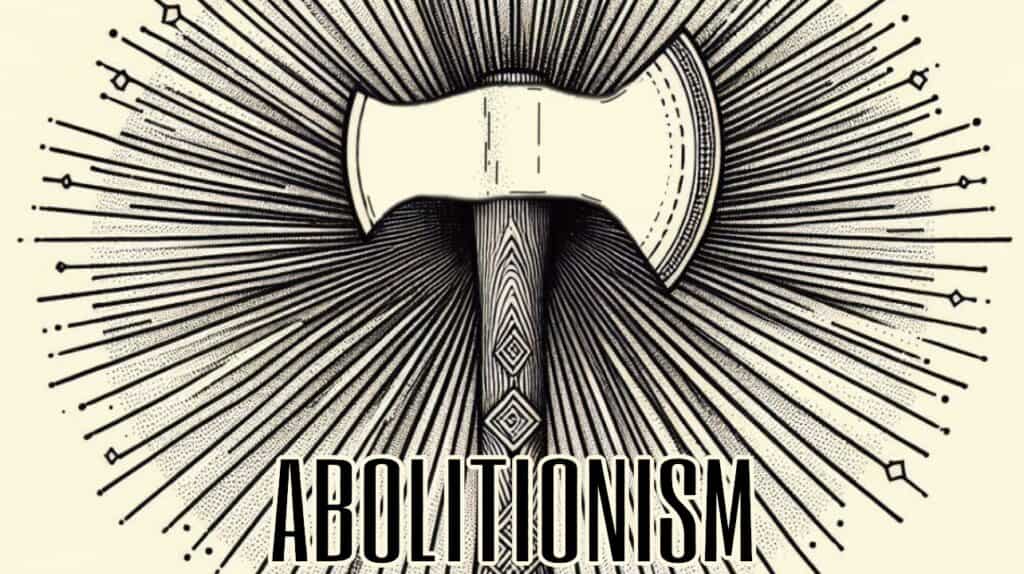“If you (only) want to save babies, be a paramedic or fireman. We are Abortion Abolitionists, and we do what we do to glorify God, which, by extension, seeks equal justice for all people, including preborn babies.”
This quote is from an abolitionist who is new to the movement, but it captures the heart of their conviction. Amidst all the various opportunities for saving lives, abortion abolitionists intensely feel led to address one of the gravest moral evils facing our generation – the abortion of human babies – and thus work aggressively, immediately and unconditionally toward its total abolition. They declare that the glory of God requires them to defend individuals created in God’s image, including the least of these. This article will discuss the characteristics of abortion abolitionism, why immediatism is a biblical mandate, and how the Gospel requires us to love both unborn children and people in need of repentance and grace.
Difference between Abolitionism and the Pro-Life Movement
Most assume “pro-life” and “abolitionist” are synonymous terms. While they share the fundamental belief that abortion is the murder of an innocent human being, there are some critical differences:
Unbending Position: Abolitionists demand the immediate and total abolition of abortion, insisting that any incremental measure – such as 15-week bans or heartbeat bills – defends or accepts abortion at earlier stages. In contrast, most pro-life organizations advocate for incremental legislation to restrict abortion gradually.
Gospel-Centered Advocacy: The abolitionism movement flows from theology for the glory of God. While many other pro-life groups incorporate elements of faith into their messages, few are as committed to putting allegiance to Christ and biblical justice first, without allowing political expediency to outweigh moral absolutes.
Historical and Theological Parallels: Contemporary abolitionists of abortion – just as 19th-century abolitionists of slavery who advocated for the immediate emancipation of the slaves – do not want to implement waiting periods or legal exceptions. In their battle for slave freedom, William Lloyd Garrison and his associates publicly rejected gradualist solutions with their cries for “Immediate emancipation!” Today’s abolitionists adhere to the same theological principle: Any legal accommodation of human personhood is unjust.
Immediatism: A Biblical Imperative
Abolitionists are often called extremists for refusing incrementalism. This is derived from the Scripture’s call for immediate repentance.
The Prophets’ Calls: Prophets such as Isaiah, Jeremiah and Amos immediately called Israel to repent of her sins: “Cease to do evil, learn to do good; seek justice, correct oppression” (Isaiah 1:16–17). These were not invitations to incremental reform but for immediate repentance from sin.
God’s Justice: “You shall not pervert the justice due the poor in his cause” (Exodus 23:6). The unfair solutions that expose at least some children to harm annihilate biblical fairness at the point of life and death. James 1:27 instructs, “Religion that is pure and undefiled before God…is this: to visit orphans and widows in their affliction.” If it is accepted that the unborn are fully human, then it should be extended that neglecting them is a serious injustice.
The Culture of Death: Incremental legislation (such as a 15-week ban) declares that the life of a child under 15 weeks of age is disposable. Abolitionists reject such a position because it affirms the lie that some unborn babies – those younger than 15 weeks – are “less human” than others, and, in doing so, continues the culture of abortion. Such legislation confirms the sin of partiality, which is condemned in scripture: “You shall do no injustice in court. You shall not be partial to the poor or defer to the great, but in righteousness shall you judge your neighbor” (Leviticus 19:15). By having exceptions, incremental laws practice injustice and don’t champion the worth of all life and delays repentance and justice.
Abolitionists believe that where sin abounds, immediate repentance is required. No righteous law would codify some murders for the sake of limiting others. If the unborn are indeed human persons, then to legislate acceptable limits on killing them is to legalize injustice.
Common Objections
Prosecuting Mothers: Perhaps the biggest objection is whether mothers would be prosecuted under abolitionist laws. Abolitionists believe that everyone deserves equal legal protection and equal justice under the law. If a mother willingly conspires to kill her child, that child has the same legal status as any human being outside the womb. Abolitionists also adhere to biblical principles of justice and mercy, and the courts are currently established to consider intent, coercion and other factors. The law should protect all children equally.
Rape or Incest: While cases of rape or incest are the most devastating, they do not devalue the life of the conceived child. Abolitionists contend that the atrocities of the father do not diminish the value of the child’s life. The Christian position is to stand with women through such tragedies, offer loving support (emotionally, financially and spiritually), and defend the preborn’s humanity.
Ectopic Pregnancies and Medical Exceptions: Genuine medical emergencies are interventions that save the life of the mother when a child may not survive (ie: ectopic pregnancies). Abolitionists distinguish between abortions (purposely taking the life of a child) and tragic cases where an unborn child simply cannot live (tubal rupture). Abolitionists believe in medical professionals saving both lives but do not place intentional abortions in the same category.
Testimonies of Grace and Mercy
The truth about abortion is not political or theoretical. The truth about abortion concerns real human beings and leaves deep in its wake scars of sorrow, guilt and regret. One such touching testimony is that of a father and now an abolitionist:
“Many of you know this already, some do not. When I was 19, I had a daughter with a woman who often joked about getting an abortion. She talked about falling down the stairs or using a coat hanger to ‘do it.’ My daughter is alive today, but our second child was murdered. Her mother and I decided on abortion. I paid for it and that was my sole welcome contribution because of her body, her choice.
My daughter was just a few months old when her mother got pregnant again. I bought into my own sob story of how two kids were too hard to raise and we could not afford to have it. I lied to myself. I lied to God. I took my own child to the abortion mill.
I had asked for forgiveness, but I did not rightly understand God’s forgiveness then; it was superficial and not from the heart.
The forbearance of my brothers and the witness combined with scripture created the opening for the Holy Spirit to move in and just destroy me. The Holy Spirit was neither gentle with me; He was fierce. I was forced to confront my sins and beg for forgiveness that I so desperately needed, yet did not deserve. Fatherly forgiveness.
I prayed. I cried out to God in desperation. I confessed my sins: not only for my child’s death but my whole life of rebellion. I submitted to the blood of Christ and sought forgiveness for taking the life of my child. I opened my tear-filled eyes to know the forgiveness of God washed over me. Instant peace – overwhelming, all-consuming mercy and love – impressed itself on my being that day, and it is something I will never forget.“
The personal testimony of this father is the very intersection of God’s justice and grace. He felt the weight of sin that crushes the heart and the unimaginable delight of God’s forgiveness that changes the heart from stone to flesh. There are countless others like it. They are reminders that the abolitionist ministry is not of condemnation but of bringing broken sinners to Christ’s cross where forgiveness flows.
Strengthening the Gospel Connection
Personal Transformation: The abolitionist worldview believes that the Gospel of Jesus Christ alone can transform hearts. Transformed law without transformed hearts merely addresses outward behavior. When Christ convicts a man’s spirit, the Holy Spirit then convicts him of sin, whether it be complacency about abortion or active involvement in it. “There is therefore now no condemnation for those who are in Christ Jesus” (Romans 8:1).
Cultural Change: Throughout Scripture, when a few people truly repent, entire cultures can be revolutionized. Some biblical examples are the immediate repentance of Nineveh in response to Jonah’s preaching and the large-scale revivals in Kings and Chronicles when godly leaders called their people back to covenant obedience. More recently, abolitionists clung to their biblical convictions and worked tirelessly until slavery was no longer legally acceptable. Modern-day abolitionists regard themselves as part of that same line of no-compromise Christian reform: proclaiming the Gospel, calling the nation to repentance, and refusing to negotiate about the value of human lives.
The Church’s Responsibility
Abolitionists call on church congregations to boldly, not passively, oppose abortion, and believe it is an offense to God that the church does not speak or act against evil (Ezekiel 33:8). In the Word of God, Christians have been commanded to “pursue justice, right oppression,” as stated in Isaiah 1:17. Local churches can be involved with the following:
Teaching: There needs to be strong, unflinching biblical Imago Dei theology taught in every church. Pastors should preach that all humans, even the unborn, are image-bearers of God.
Outreach: Support crisis pregnancy ministries or establish church-sponsored ministries for indigent mothers offering spiritual, financial and emotional support.
Public Witness: Mobilize members to become involved in their communities, attend city council meetings, and work for legislation that treats the unborn as fully protected citizens.
Prayer: Have regular corporate prayer solely for the abolition of abortion, repentance of the nation, and salvation of abortion industry workers.
A Strong Call to Action
Abolitionists don’t just want to draw attention, but action. To the reader who accepts this message – whoever you are, pro-choice, pro-life or starving for truth – there are specific ways to get involved:
- Educate yourself
- Read abolitionist literature
- Learn what the Bible teaches regarding justice, mercy and the sanctity of human life.
- Numerous abolitionist groups exist that coordinate local and national efforts to abolish abortion.
- Volunteer, donate financially, or participate in their events to promote unity and a stronger combined impact.
- Call your local government officials and request that they introduce legislation that acknowledges personhood from fertilization and ban all abortion, without exception or compromise.
- Share it on social media, leading your friends and family to moral duty.
- Declare the Gospel publicly and fearlessly! The Gospel converts hearts; declare it to the unplanned pregnant and those suffocating under the weight of their past choices of abortion.
- Stand with sidewalk counseling ministries at abortion clinics as they offer hope, prayer and material assistance.
Conclusion
Abolitionism is not a movement of the larger pro-life coalition: It is an odd, Gospel-driven call to abolish abortion today. Based on the unshakable faith that every human person is made in the image of God, abolitionists will not make deals with politics or culture around whose life has value. They embrace the biblical principle that repentance is to be instant, justice blind and mercy abundant.
Whether you are pro-life, pro-choice, or undecided, abolitionists welcome you to consider how glorifying God requires us to defend our preborn neighbors. Hearts can change, forgiveness can be sought, and cultures can transform through Christ, just as they always have whenever God’s people have stepped in to fight against evil. Let us repent, believe and act on behalf of those who cannot defend themselves, believing that, in all things, God would be glorified.
As a post-abortive father, Justin Weidman found redemption and forgiveness in his Savior Jesus Christ. Through the Gospel and Abolitionists Rising, he embraced immediate and uncompromising abolition. Justin is a signer of the Norman Statement.





